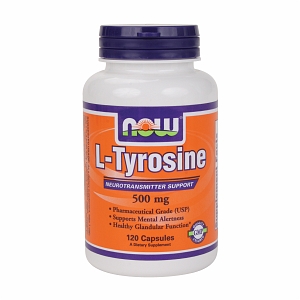By Kevin Cann – Steroidal.com Contributor
The supplement industry in the United States nets about $32 billion in sales according to a Forbes 2012 report. Most of the products sold on the shelves are nothing more than ineffective gimmicks made to drain your bank account. No pill or product will ever be able to outperform hard work, but are there supplements out there that when combined with hard work can make you a fitness ninja? One of them I will discuss today is the role of L-tyrosine and sports performance.
 L-tyrosine is an amino acid found primarily in animal products. Yes, eating meat is important to sports performance, not only for the raw materials to build and repair muscle tissue, but for brain chemical messengers known as neurotransmitters. Tyrosine so happens to be the precursor for our dopamine neurotransmitter.
L-tyrosine is an amino acid found primarily in animal products. Yes, eating meat is important to sports performance, not only for the raw materials to build and repair muscle tissue, but for brain chemical messengers known as neurotransmitters. Tyrosine so happens to be the precursor for our dopamine neurotransmitter.
Dopamine is our hunt and reward neurotransmitter. It plays a critical role in memory, focus, and energy levels. All of which play vital roles in competing at a high level. From poor dietary choices, stress, lack of sleep, and other poor lifestyle behaviors our dopamine can become depleted and with it our mood, energy, focus, and memory.
Dopamine also plays a critical role in our ability to exercise. Dopamine is our key modulator of heart rate, blood pressure, and renal function as well as muscle tone and protein synthesis [1]. Exercise actually enhances dopamine’s ability to do all of those physiological feats. Some researchers have hypothesized that there is a 50% decrease in nigh time dopamine excretion in over trained athletes [2]. A couple major symptoms of overtraining are decreased performance and increased injury risk.
The military has been experimenting with tyrosine on troops to help negate the stresses associated with fighting a war. These studies have shown that tyrosine supplementation improves cognitive function by reducing the role stress and fatigue play on memory as well as lowering blood pressure [3]. This is as important to an athlete as it is to a soldier.
Think about an athlete at the end of a game and the performance of teams late in games. This is where mistakes are made and games are won and lost. Think cognitive function plays a role in identifying offensive or defensive plays? My hypothesis is that dopamine plays a critical role in the decreased cognitive function of athletes late in a game. If tyrosine supplementation can aid military troops by improving cognitive function during combat situations, then it should be able to help an athlete in a contest.
Another major influencer on sports performance is travel. Often athletes are traveling across time zones and not sleeping in their own beds. This can lead to decreased sleep quality which in turn can lead to decreased performance. Just think how successful professional teams are when they have to travel across time zones. The good news is that tyrosine supplementation may be able to help in these situations as well. Studies have shown that when subjects take 150mg/kg of tyrosine they show an increase in motor functions as well as cognitive function during sleep deprivation [4].
That is a large dosage of tyrosine. For a 165lb person that equates to roughly 11g of tyrosine. The studies done on the military personal used 2g. The military studies that I saw did not mention sleep, but my guess is that it is less then optimal. I would suggest a daily intake of tyrosine that is between 4-6g per day. This should be taken in intervals throughout the day on an empty stomach as amino acids compete with one another to cross the blood brain barrier. Taking 2g upon waking, between breakfast and lunch, and optional between lunch and dinner is my recommendation. I would not take tyrosine any later then that as it can negatively affect sleep. If you feel it negatively affects sleep with the dosage between lunch and dinner just remove it and take the tyrosine between the other two times.
Always consult your physician before taking any supplements. Do not take tyrosine if you are on thyroid medication or taking levodopa as it can interfere with these medications. If choosing to take tyrosine at 150mg/kg of body weight cycle off of it after 3 months as it may be potentially dangerous after that time period.
References:
[1]. Mech Ageing Dev. 1995 Oct 13;84(2):83-102.
[2]. Int J Sports Med 1992; 13(3): 236-242
[3]. Brain Res Bull. 1999 Jan 15;48(2):203-9.
[4]. Nutr Neurosci. 2003 Aug;6(4):237-46.







